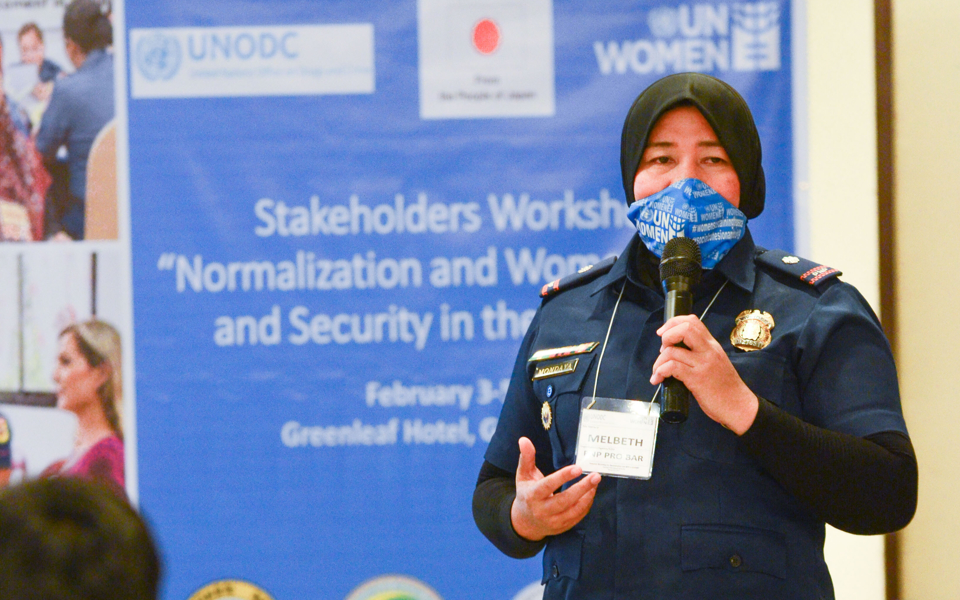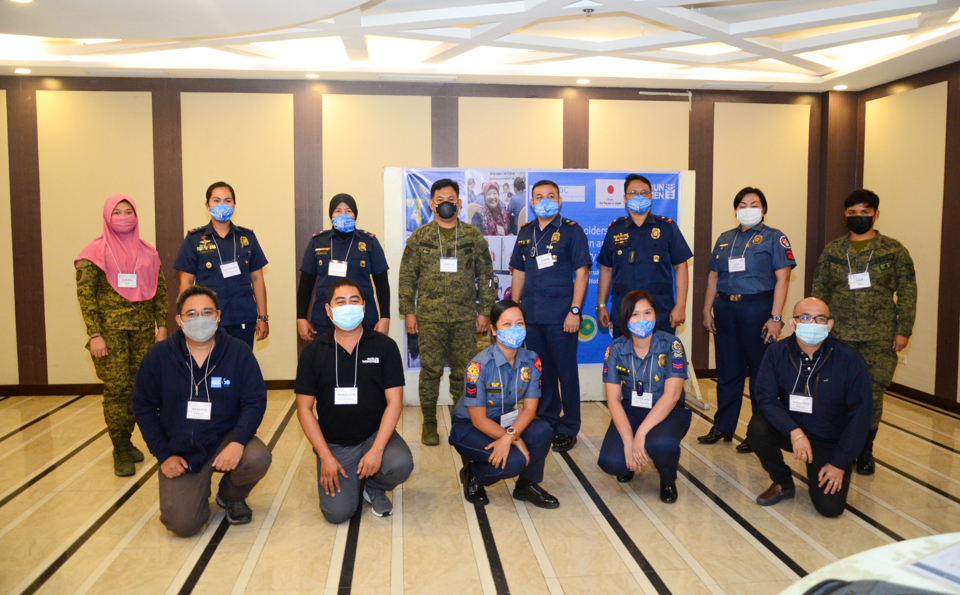Championing a more peaceful, secure and gender-inclusive BARMM
Date:

As a demonstration of commitment to place gender at the core of collaborative security action in the Bangsamoro Autonomous Region in Muslim Mindanao (BARMM) in the Philippines, representatives from the Government and from the Moro Islamic Liberation Front, security actors and representatives from women’s organizations came together for a three-day workshop (3–5 February 2021) to discuss how to strengthen cooperation on a range of issues related to gender and security in BARMM.
Hosted by UN Women, in partnership with the United Nations Office on Drugs and Crime (UNODC), and supported by the Government of Japan, the workshop contributed to the overall normalization process towards peace and security in the BARMM. One particular goal was for security sector actors in BARMM to have increased access to evidence and knowledge in order to advance gender-responsive law enforcement processes, including gender-sensitive recruitment, retention and promotion. The workshop aimed to discuss what role BARMM security actors could assume in this regard.
Speaking on the topic and drawing from recent research on Women in Law Enforcement in the ASEAN Region, commissioned by UN Women, UNODC, and the International Criminal Police Organization (INTERPOL), and the associated workshop in BARMM with women officers from the Philippine National Police (PNP), the Armed Forces of the Philippines (AFP), and military combatants from the Bangsamoro Islamic Women Auxiliary Brigade (BIWAB) in February 2020, Dr. Melissa Jardine, Regional Research Lead, highlighted the following points:
- In relation to recruitment, a quota of 20 per cent for women recruits is reached more frequently than the quota for men in the PNP,[1] which consequently acts as a ceiling on women’s annual recruitment. In 2017, the number of male recruits fell short of the 80 per cent quota for men[2] and, consequently, women made up 25 per cent of successful applicants[3]. There have been calls from some in the Government, Human Rights Commission and the PNP to increase the quota for women recruits.
- The PNP has begun removing identifying details from police applications.[4] However, the PNP still requires information on the applicant’s gender to apply the quotas for men and women. Removing identifying information has been positively used to remove gender bias in some industry recruitment processes.
- The perception remains that women are more suitable for administrative and office-based roles, despite women officers having been successfully deployed across a wide range of functions. Crucially, an officer’s deployment upon graduating from initial training can have long-lasting impacts on future opportunities.
- Ensuring women have the opportunity to undertake a wider range of deployments early in their careers can contribute to women officers acquiring the requisite experience to assume wider responsibilities as leaders in the PNP in the future.
- The PNP Unit Training Programme Development Division has a Gender and Development/Moral Recovery Section.[5] The Police Community Relations (PCR) Manual for 2012 defines PCR as a community-oriented policing ideology and identifies gender and development as one of the paradigms. However, the manual needs to integrate gender considerations throughout community policing elements or components.
With practical application in mind, workshop participants, including representatives from the AFP, PNP – Central Office, Police Regional Office Bangsamoro Autonomous Region (PRO BAR), BIWAB, Bangsamoro Women Commission, Government of the Philippines Joint Peace and Security Committee, Moro Islamic Liberation Front Joint Peace and Security Committee, Ministry of Interior and Local Government’s Rapid Emergency Action on Disaster Incidence and Ministry of Public Order and Safety, discussed how to overcome challenges to gender-inclusive security action and put forward a number of recommendations, including the following:
- Reviewing and creating a consensus among entities on a gender-inclusive security sector policy.
- Reinforcing and monitoring the implementation of relevant policies at all levels, from the Central Office down to the community level.
- Utilizing the full extent of the Gender and Development Budget to drive meaningful outcomes for women and communities.
- Increasing the annual recruitment quota for women in the PNP beyond the current quota stipulated in the Philippine National Police Reform and Reorganization Act, noting that the quotas for women’s recruitment are being exceeded.
- Supporting women’s leadership in the security sector, including through career development opportunities, coaching and training programmes and addressing gender stereotypes regarding deployment.
- Developing networks and a community of practice among women and gender equality champions in law enforcement to share good practices and build support.
- Establishing family-friendly spaces in law enforcement structures to support women balancing professional and family responsibilities.
Reflecting on the advancement made in BARMM, UN Women’s Representative for the Philippines, Ms. Carla Silbert, highlighted that, “the recent adoption of the Regional Action Plan on Women, Peace and Security in BARMM gives us an excellent new framework through which to work towards building more gender-inclusive outcomes for communities and security actors alike”.

Looking forward, UN Women and UNODC, with the support of the Government of Japan, will continue to champion a more peaceful, secure and gender-inclusive BARMM by empowering women to promote peace, security and resilience in their communities, including through the development of training modules on gender- and culture-sensitive community policing. In addition, security sector actors have increased access to evidence and knowledge to advance gender-responsive law enforcement processes.
_____
[1] Republic of the Philippines, Philippine National Police, Annual Report 2017, p. 54; Annual Report 2018, p. 45.
[2] Op.cit., Annual Report 2017, p. 54.
[3] Ibid. In 2017, 1,913 women were recruited for 2,000 positions.
[4] Philippines Information Agency, “PNP Hiring 17,000 Cops in 2020”, 3 January 2020.
[5] Philippine National Police Manual. Human Resource and Doctrine Development Manual, September 2014.